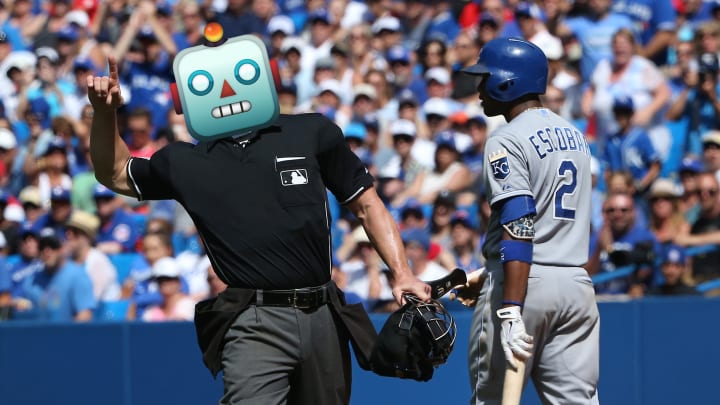Robot Umpires Put Us One Step Closer to the Robot Revolution Sci-Fi Movies Warned Us Of

The robots are here to stay and that's not a good thing.
The independent Atlantic League recently announced its robot umpires will stick around until the close of this season at least. And on the surface, that seems like an awesome idea.
After all, the robot umpires are just there to call balls and strikes, and the human calling he shots behind home plate is allowed to overrule the robot. In theory, it should be all good.
The robots can provide assistance with Doppler radar and potentially create a more accurate and consistent strike zone, which would probably lead to a slight decrease in ejections over ball and strike calls and overall happiness for all parties at a baseball game. It's a win-win.
Not only are we going to get closer to the perfect accuracy all fans claim they want until it hurts their team, but we also might reduce the number of verbal altercations over whether or not a human could for sure tell that a ball crossed the plate above a batter's knee and not at his shin.
But as somebody who loves watching Black Mirror and thinking about how those ideas will actually come back to haunt us and gets fairly afraid each time I see a new trick from the robots at Boston Dynamics, this feels like a slippery slope into a world of officiating we don't actually want to live in.
Because if the robot umpires and the Automated Ball-Strike System (ABS) work out as well as players, managers, umpires and fans feel they are working now, that only means adjustments to let them do more are right around the corner. You see what we are doing with replay and how that is becoming more and more prominent for the sake of getting the right call. And you see how excessive it feels at times when replay catches something it wasn't even looking for or something looks exponentially worse because we zoomed in and slowed up the speed to allow extreme nitpicking.
But what happens when the official is just a fancy computer? When each play naturally gets replayed and put in super-duper slow-mo the instant after it happens to speed up the process so there's no need for a call from the booth or to wait on a challenge from a coach or manager?
How long until NBA courts have three or four machines with wheels roaming around with a handful of additional cameras positioned at blind spots to increase the accuracy of calls? When will football be monitored by a handful of specialized computers that sync up with technology implanted in uniforms to decide on penalties and yellow flags are just shot from a designated robot somewhere on the field instead of getting tossed by the referee who saw the violation?
These might sound like crackpot theories right now, but so did the idea of having a mini-computer in your pocket that makes phones calls, sends emails, recognizes your fingerprint and can edit your face so you have cute dog ears or a bunny nose.
And the issue with robot umpires and the future they are sure to bring isn't that players' personal information will get sold to the Russians and destroy our democracy—although I wouldn't entirely rule that out—but that it starts us down a path where we become too reliant on the technology. A world where each and every call must be 100% correct and the room normally allotted for human error in sports is completely removed and regular people are no longer good enough to officiate games.
Similar to the new challenge rules in the NBA and the expanded challenge rules in the NFL, we've become overly obsessed with correcting human error for the sake of creating perfect officiating when that will never happen.
If the robot umpires are here to stay in their current form (home plate umpire communicating with TrackMan computer system via iPhone) it's only a matter of time before umpires are equipped with special glasses right out of Black Mirror that color code the strike zone and make every call as easy as possible and can even detect check-swings.
It sounds dope.
Just like the plot of every science fiction movie in the history of ever before the robots revolt or the humans left responsible for the robots go mad with power. Obviously these are the worst-case scenarios, but they should still be considered. I mean, literally everything that goes wrong with robots and technology is touted as the worst-case scenario until it becomes the reality.
We are treading closer and closer to an existence where we do everything possible to either merge humans with technology or create some sort of machine to handle a responsibility a human used to take care of and both of those options should scare the hell out of you.
Getting more accurate calls for balls and strikes is just the beginning of humanity's demise, and I just hope the strike zone consistency is really worth it.
Because when the robot revolution does come to wipe us out and Pat Fitzgerald is still yelling at people for using their iPhones instead of watching the takeover in-person, I'll be here thinking about when we let the robots into baseball and how that started our downfall.
